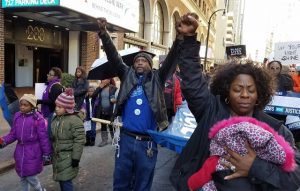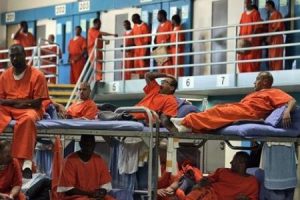Crime

Much of the Black Community is especially hard-hit by the social problems of theft and other crimes. This is probably due to the lingering effects of Slavery in economically depressed communities, including decreased self-esteem and decreased community spirit.
It is likely that attempts to address the problem by increasing the numbers of police officers, prisons, and judges will be both inefficient and inadequate in reversing this problem. Worse, by mistakenly identifying the people as the problem, the problem will probably continue to be made worse. Those most affected by the problem will also be most negatively affected by these “solutions”. The effect will be further loss of both self-esteem and community spirit creating a vicious circle in the communities hardest hit.
The good news is, an efficient solution found for such communities will probably have very positive value to many other depressed communities throughout the world. Many other communities, including some Native American, some African, some South American, some Asian and others have suffered similarly as a result of colonialization, genocide, etc. In many of these communities the same depression in self-esteem and community spirit can be found.
It would probably be most effective to address the existing root causes of the problem — artificially depressed self-esteem and community spirit. This could done by simultaneously working in several ways to address the problem:
1) Coordinating a program of education of the effects of depressed self- esteem and community spirit throughout all age groups and across all social and economic population groups. Educating the depressed communities would not be enough. If more advantaged communities continued to have misperceptions about the depressed communities, those perceptions would be absorbed to an extent by the depressed communities themselves and work against recovery.
This could be achieved through contests at schools, churches, on radio, etc. where authors of relevant poems and essays are awarded prizes or given culturally significant trips.
Advertisement campaigns similar to the anti-smoking ads and the “positive Christian values” ads would help also. The cost for these ads could be shared with other companies, which would also benefit from the positive association.
2) Manipulating the image of the depressed communities in television, radio, and other entertainment media and art. In a capitalist society, it will often benefit corporations to provide entertainment that large numbers of people in depressed communities will be attracted to — even when that entertainment further depresses the self-esteem and community spirit of those same communities. Examples of this can be seen today in movies, television shows, and popular music that seem to glorify violence, inappropriate behavior and language, and child-like interactions between adults.
This image management can be addressed through signed petitions and letter campaigns of the type that are commonly used to show politicians how much support there is behind a particular issue.
We can also form organizations to provide public ratings of the television shows, movies, radio shows, music artists, etc. These ratings can be released as press releases to news organizations to put more pressure on corporations to provide better content.
Finally, we can form our own corporations to provide the content we need. In most cases, there are fewer positive movies, television shows, radio shows, etc. available to appeal to large segments of the Black community than can be supported by that community. There is plenty of demand still not being met. There are plenty of artists that are available to work on projects. Distribution-related companies are needed as well as large minority-oriented retail stores.

3) Promoting education and career growth within the depressed communities. Depressed self-esteem leads to people ending their education earlier than they would otherwise. It also leads to people not achieving at their full potential within their careers. Depressed community spirit leads to people getting less positive reinforcement in their education and career development, creating a vicious circle that can more easily be broken with help from more empowered minorities and the general population.
Recent legal activity in the area of Affirmative Action in Education has resulted in universities backing away from the overt attempts previously used to recruit minority students. The University of Michigan has chosen instead to add other factors to the evaluation process, such as the prospective student’s awareness of diverse cultures and the student’s having overcome barriers ( single-parent families, overcoming adverse social and economic conditions, etc. ). U.M. has also chosen to continue to consider race, gender, etc. but does not use “quotas” in this way.
The Black community is free, though, to monitor trends in enrollment with regards to race, etc. itself. Again, organizations can be formed to collect data and feed results to the public and to the institutions themselves so that they can put policy corrections in place as needed.
4) Promoting Community Economic Development within the depressed communities. Depressed communities are often caught in a vicious circle where depressed self-esteem and community spirit lead to depression of economic power ( through lack of education, lack of peer support in career development, etc. ), and the depression of economic power leads to depressed self-esteem and community spirit. We need to work both sides of the vicious circle to effectively address the problem.
While there has been some backlash against Affirmative Action minority set-aside contracts, some of the strategies used for continued Affirmative Action in education can be used for Economic Development. Governments can set aside contracts to firms that more positively impact economically depressed communities. Additionally, we can form organizations to watch for and reward companies that more positively impact these communities. These rewards can be in the form of news releases, banquets and other events within the community, etc.
We can also form think tanks specifically for the purpose of tracking economic forces and developments within individual communities. While we have organizations to perform this function across Black America nationally, we need this function at the community level so that we can most effectively influence governments and corporations to improve the economics in these communities. We also need this function to determine in which industries we should work hardest to promote new business development in these communities.
We can also plan to apply 50% of any Reparations money to funding organizations that work to improve the quality of life in depressed Black communities.
5) Promoting community political development. Depressed communities often suffer from having less political power than they need and than they should have by virtue of their population and economic size. This lack of political power impedes attempts to put the money collected from these communities in taxes to effective use in ways that will benefit these communities. This inefficiency makes it more expensive for the Black community as a whole to address problems in these communities.
We can address this problem by forming organizations to monitor trends in these communities, such as the Joint Center for Political and Economic Studies. We need to perform this function at the community, city, state, and federal levels — every level at which there is an elected official to represent our cause in government.
We can also put more positive pressure on government by forming organizations to track and report regularly on the “Best and Worst Places to Live for Black Americans” – including best communities, cities, states, and countries. This information can be distributed as press releases at each level and effective government representatives can be rewarded for their service.

There will be also be areas in which we need to direct political power outside of the government wherever we have continuing and historic lack of representation. We see often that when the Black community makes up a given percentage of a given population, we are elected to political office a much lower percentage of the time. In cases like this we can form organizations to help government tend to the needs and desires of our community — through cooperative action when applicable, and through supplantive action when necessary.

